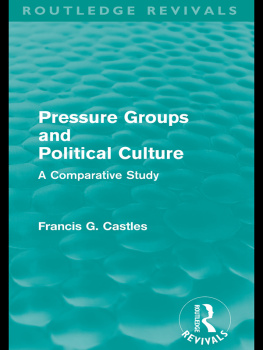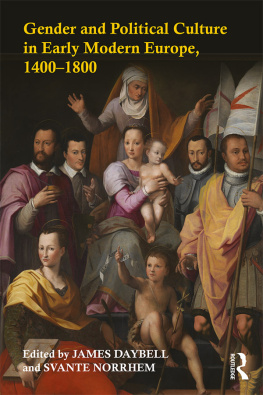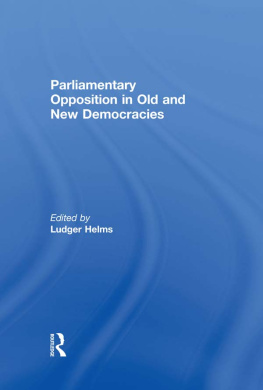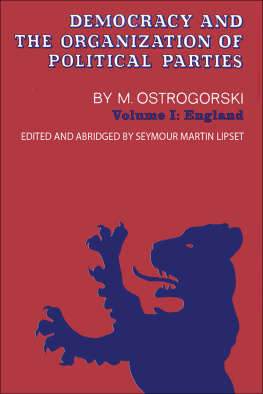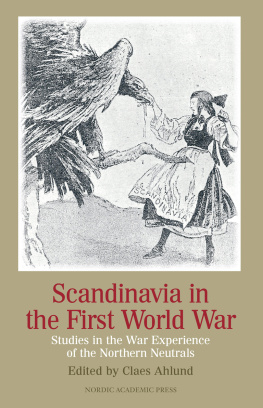First published in 1967
by Routledge & Kegan Paul
This edition first published in 2009 by Routledge
2 Park Square, Milton Park, Abingdon, Oxon, OX14 4RN
Simultaneously published in the USA and Canada
by Routledge
270 Madison Avenue, New York, NY 10016
Routledge is an imprint of the Taylor & Francis Group, an informa business
This edition published in the Taylor & Francis e-Library, 2009.
To purchase your own copy of this or any of Taylor & Francis or Routledges collection of thousands of eBooks please go to www.eBookstore.tandf.co.uk.
1967 Francis G.Castles
All rights reserved. No part of this book may be reprinted or reproduced or utilised in any form or by any electronic, mechanical, or other means, now known or hereafter invented, including photocopying and recording, or in any information storage or retrieval system, without permission in writing from the publishers.
Publishers Note
The publisher has gone to great lengths to ensure the quality of this reprint but points out that some imperfections in the original copies may be apparent.
Disclaimer
The publisher has made every effort to trace copyright holders and welcomes correspondence from those they have been unable to contact.
ISBN 0-203-09230-9 Master e-book ISBN
ISBN 13:978-0-415-55759-7 (hbk)
ISBN 13:978-0-203-09230-9 (ebk)
ISBN 10:0-415-55759-3 (hbk)
ISBN 10:0-203-09230-9 (ebk)
Pressure groups and political culture
LIBRARY OF POLITICAL STUDIES
GENERAL EDITOR:
PROFESSOR H.VICTOR WISEMAN
Department of Government
University of Exeter
Pressure groups and political culture
A comparative study
by Francis G.Castles
Assistant Lecturer in Politics
University of York
First published 1967
by Routledge and Kegan Paul Ltd
Broadway House, 6874 Carter Lane
London, E.C.4
This edition published in the Taylor & Francis e-Library, 2009.
To purchase your own copy of this or any of Taylor & Francis or Routledges collection of thousands of eBooks please go to www.eBookstore.tandf.co.uk.
Francis G.Castles 1967
No part of this book may be reproduced in any form without permission from the publisher, except for the quotation of brief passages in criticism
ISBN 0-203-09230-9 Master e-book ISBN
General editors introduction
This series of paper-back monographs is designed primarily to meet the needs of students of government, politics, or political science in Universities and other institutions providing courses leading to degrees. Each volume aims to provide a brief general introduction indicating the significance of its topic e.g. executives, parties, pressure groups, etc., and then a longer case study relevant to the general topic. First year students will thus be introduced to the kind of detailed work on which all generalizations must be based, while more mature students will have an opportunity to become acquainted with recent original research in a variety of fields. The series will eventually provide a comprehensive coverage of most aspects of political science in a more interesting and fundamental manner than in the large volume which often fails to compensate by breadth what it inevitably lacks in depth.
This volume offers a new approach to the study of pressure groups, whose importance in the British political system has been increasingly recognized in recent years. Mr. Castles seeks to throw light on this topic, firstly by examining the theoretical approaches to an understanding of their role in the political process and secondly by presenting a number of specific studies. For the first time, in one small volume, the reader can become acquainted with pressure groups in continental Europe, Scandinavia, the United States, the totalitarian countries, and the emergent nations. The study is comprehensive in itself and also an invaluable guide to more detailed work in this field of political science.
H.V.W.
Preface: the science of politics
The general tone of political studies is not, I think it will be almost universally admitted, a scientific one. More to the point, it is felt in many quarters that it neither could nor should attempt to ape the aims and methods of the scientific disciplines. The study of Politics is here at variance with developments in other branches of the Social Sciences. Economics has developed an avowedly empiricist and positivist approach to its material, and Sociology, at least the more modern schools, seems to be following in its footsteps. Despite this, Politics has on the whole eschewed the nomothetic generalizing methods of its sister disciplines, and has largely contented itself with either philosophic speculation or the ideographic, historical approach.
This preface, and indeed the whole of this book, is a plea for Politics as a discipline to make itself more scientific. This does not imply any desire to ape the methods of the Physical Sciences as such, but instead of making our primary task the description and understanding (Verstehen, as Weber called it) of past concatenations of events, we should attempt some more general classification of political phenomena and, moreover, evolve hypotheses capable of testing and refutation; our eventual aim being at least some minimal ability to predict the likely outcomes of a number of political events.

